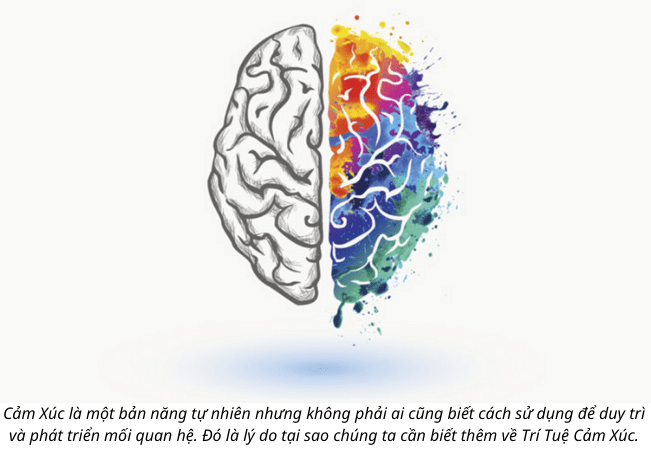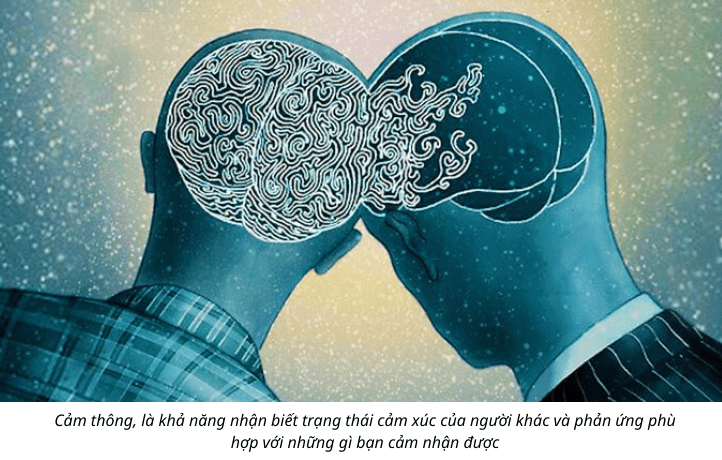Note: Please read the article carefully before proceeding! If in the process of using you encounter any errors, such as broken download links, slow loading blog, or not being able to access a certain page on the blog … then please inform me through the Contact page. Thanks!
Sometimes interacting with others hurts and hurts us. On the contrary, although it is not intentional but in just a few emotional seconds, we can not keep calm to have a better relationship with others.
Emotions are a natural instinct, but not everyone knows how to use them to maintain and develop relationships. That is why we need to know more about Emotional Intelligence.
–

Emotional Intelligence is the ability to identify emotions of oneself and others. After clearly identifying emotions, we will direct our thoughts and actions in accordance with that situation.
For some professionals, Emotion Intelligence Index (EQ) is even more important Intelligence quotient (IQ). Many studies have shown that emotional intelligence greatly influences decision making and handling situations.
So how to train Emotional Intelligence? Yes! According to Daniel Goleman (Psychologist), there are 5 factors that make up Emotional Intelligence. If you do not know, let's learn about these five factors and how to practice them to improve our emotional intelligence!
#first. Self-awareness
Self-awareness is the ability to recognize and understand your emotions. Based on recognizing your emotions, you will be well aware of how your actions, moods and emotions affect others.
To better recognize your emotions, you need to practice tracking your emotions by:
+ Recognize the emotional response you currently have.
(For example, after listening to your boss scolded, you find yourself having a hot reaction, a blushing face, a fast heartbeat, trembling limbs, a whirling mind) …
+ Identify different emotions by naming those feelings.
(For example, the same example above, you name the reaction you are “angry”, “embarrassed”, “disappointed, …) …

When you are emotionally aware, you are also aware of your feelings and anticipate the actions of others. Goleman thinks that people who have a good feeling about themselves and people are often very confident and aware of how others feel about them.
#2. Self-regulatory
Self-regulation is the ability to regulate and manage your own emotions. This does not mean repressing and hiding your true feelings.
But you need to wait at the right time, the right place, to express your true feelings. Self-regulation means expressing emotions appropriately.
People with self-regulation skills are flexible and adapt well to changes. They are also very good at controlling conflicts or solving problems.

Goleman said that people who self-regulate good emotions are highly self-conscious. They know how to influence others and are fully responsible for their actions.
# 3. Social skills
Good communication with others is another important element of Emotional Intelligence.
Not only do they understand their feelings, they also understand the feelings of others. Understanding others is the information that helps make decisions appropriate to the interests of the parties.

At work, managers will be more successful if they keep a good relationship and connect employees in the office together.
And employees also work more effectively when developing relationships between colleagues and superiors. Social skills include listening, body language, communication, leadership and persuasion.
# 4. Sympathy
Empathy, is the ability to recognize the emotional state of others and respond in line with what you feel.

Suppose, when you see someone sad or disappointed, you give appropriate behavior to that person as showing interest, inspiring, helping them to have an optimistic view of the current situation.
Sympathy also helps us to understand leadership strength, especially in the workplace environment. People who are able to empathize can sense who is in power in various relationships. And they also understand how that power affects the emotions and behaviors of others.
# 5. Inspire
Luxury items like reputation, money, status, recognition are not the things that motivate the person with emotional intelligence.

Instead, they look for inspiration from within, find passion to fill the inner needs. They follow the flow, tune in with the inner things and pursue that passion.
People who are good at inspiring have clear action directions. They set goals, aspire to achieve them and always find ways to make things better.
They are also very enthusiastic and proactive people at work. When we are able to inspire ourselves, we also find a way to inspire people when they are disoriented or disappointed.
Those are the 5 elements to developing a relationship with Emotional Intelligence that you should know, hope you enjoy this article!
__CTV Pham Thu Linh__Blogchiasekienthuc.com__
Note: Was this article helpful to you? Do not forget to rate the article, like and share it with your friends and relatives!